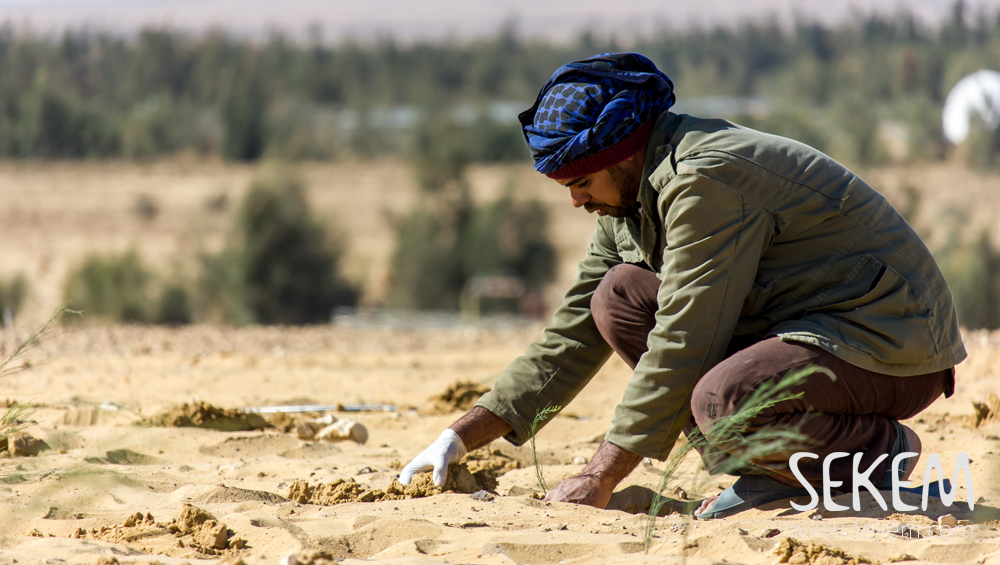Greening the desert in a sustainable way is one of the main challenges that Egypt is facing and highly important in regards to the food security of 90 million Egyptians. In this context, the Egyptian government recently initiated the 1.5 Million Feddan Project, which aims to reclaim 630.000 hectares (1.5 million feddan) desert land until 2017 in order to expand the food production. SEKEM is already committed to the reclamation of arid land via bio-dynamic agricultural methods since its foundation. In 2008 SEKEM expanded its activities and bought additional land in the western desert oasis El Bahareyya. Gradually, the dry land is turned to vital soil.
Trees play an essential role when greening the desert. They protect a farm of the harsh desert winds and make it an oasis of tranquillity. Hence, planting activities on all SEKEM Farms always start with building a green belt of trees around the area, which functions not only as windbreaker but also brings many benefits to the ecosystem of the farm. The green belt creates a new microclimate and biodiversity is supported by the variety of the cultivated land. Besides, the trees produce wood after some decades.
In the times of climate change, trees are very important in regards to carbon sequestration. As it is known, plants need CO2 for photosynthesis and growth. Hence, humans get the opportunity to clean the atmosphere and generate more oxygen by planting trees. A spruce for example, which is 100 years old and 35 meters high, stores approximately 2.6 tonnes of CO2. This sounds a lot, but is in fact an extremely small amount compared to the quantity of CO2 that people produce with transportation and in industry.
25,700 New Trees in the Egyptian Desert
Indeed, we gain all these benefits from the planted trees but it requires many years of growth and in the same time long-term investments, which unfortunately are often a big challenge in the agriculture business. However, some European companies decided to implement active climate protection and asked SEKEM for cooperation. By investing directly into trees they want to offset their CO2 emissions. Thus, for instance a partnership with the German pliers company KNIPEX has been initiated, which includes the planting of 25,700 new trees. In the framework of the project, different species of trees are planted on the SEKEM Farm in Wahat El Bahareyya. In December 2015 the first casuarina seedlings have been set. Casuarinas are known for their fast growing especially in desert climate and bind 3.5 tons of CO2 already within the first 30 years – which means an annual average of 0.12 tonnes per tree. For comparison: A single flight from Berlin to Cairo produces about 0.77 tons of CO2 per person.
Taking the responsibility
KNIPEX does not only bear the investment costs for the preparation of infrastructure, such as water pipes and the planting of the trees, but also the annual costs of irrigation and maintenance. “KNIPEX is aware of its responsibilities, which means that we will not only invest in the reforestation project in Egypt, but also adapt our corporate processes in order to actively contribute to the reduction of climate change effects”, says Carolin Sieg, project manager at KNIPEX. Additionally, the company wants to expand the project and offer “tree sponsorships” to its employees. SEKEM likes the idea as it will add a social and more personal character to the ecological project.
Such cross-financing approaches play a significant role in the sustainable development process of a society. It enables the internalization of the external costs that evolve from air pollution of an industrial plant or an aircraft, and thereby helps to contain the damage that has been done to the atmosphere. SEKEM is happy about this new partnership, the mutual benefit of cooperation and is looking forward to continue greening the desert together with KNIPEX.
Tobias Fetscher studied “Environmental and Natural Resources Management” at the University of Natural Resources and Life Sciences in Vienna. He works in SEKEM for half a year and is especially committed to sustainability management. Tobias joined the first planting of the KNIPEX-trees and wrote for the SEKEM News about the background of the project.
More about KNIPEX
Workshop on Sustainable Agriculture in SEKEM

